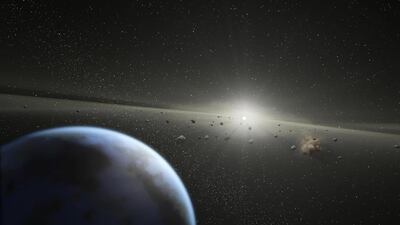Science and religion do not always see eye to eye. More than 400 years ago, the Italian astronomer Galileo Galilei was accused of heresy by the church for his beliefs, which included support for the theory that the Earth and planets revolve around the Sun. These theories are being challenged, once again, around the anniversary of Galileo’s birthday, February 15, 1564.
Sheikh Bandar Al Khaibari, a Saudi cleric visiting Khor Fakkan for an event, recently rejected the theory that Earth revolves around the Sun.
This happened when he answered a student’s question on whether the Earth is stationary or moving, and he replied: “Stationary and does not move.” He then used a visual aid to explain the logic behind his statement. “We go to Sharjah airport to travel to China by plane, clear? Focus with me, this is Earth,” he said, holding a water cup.
He said that if a plane stopped mid-flight, “China would be coming towards it” and explained that if the Earth rotates in the opposite direction, the plane would never reach China, because “China is also rotating”. In separate statements, he also dismissed Nasa’s lunar landing as faked.
Interestingly enough, this happened in an emirate that is building the region’s largest planetarium. The country as a whole is investing in space exploration.
This latest discussion reminded me of my time at school in Jeddah when we would search for scientific answers in the Quran. These were great classes. They triggered debates and discussions and really made us think.
There are several references to space in the Quran, including how the universe is always expanding and how there was “smoke” before the heavens and Earth were created.
So when I first heard what Sheikh Al Khaibari said, I was reminded of Sheikh Abdul Aziz Abdullah bin Baz, the late grand mufti of Saudi Arabia, who died in 1999.
Back in the 1960s it was reported that he made similar statements of how the Sun orbits Earth and expressed doubt about the US landing on the Moon. There were other controversies attributed to him, like how he said the Earth was flat. It is said he changed his mind about his views after talking to Prince Sultan bin Salman Al Saud, a Saudi Royal Air Force fighter pilot who went to space in 1985.
As the first Arab, the first Muslim and the first member of royalty to travel into space, Prince Sultan became an icon across the region – the poster boy for a growing pan-Arabian feeling that the sky was not the limit. His adventure brought the romance of space into homes across the Middle East, including ours. It made me want to become an astronaut.
I had the honour of meeting and interviewing Prince Sultan, who also holds the record as the first person to observe Islamic prayers and read the Quran in zero gravity and to consider the question of locating the Kaaba – the holy building at the heart of the Sacred Mosque in Mecca – from space.
“The Kaaba position kept on changing as we passed through 16 sunrises and sunsets every day and so I just faced planet Earth and prayed,” he told me. “It was remarkable, I can never forget it.”
I imagine he made the same observations to Sheikh bin Baz, who many forget was blind, and so he couldn’t watch on TV what we all saw broadcast from the shuttle.
The sun, the stars and space have always fascinated man. There have been theories related to astronomy for as long as man has looked up into the sky. Perhaps a good example of how long it can take for religion and science to reach an understanding is reflected in how it was only in 1992 that the Vatican cleared Galileo of any wrongdoing.
rghazal@thenational.ae
On Twitter: @Arabianmau

